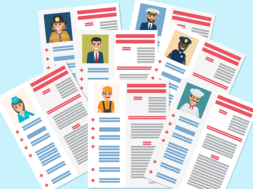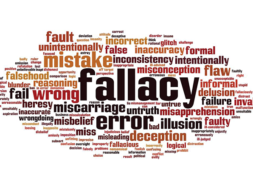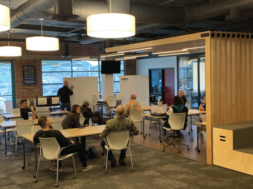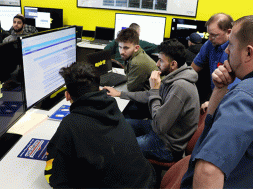
Taking Employer Partnerships to the Next Level
By Jay Hollowell, Vice President of Training, MaxKnowledge
The background
The primary mission of any career-focused educational institution, without a doubt, is to help students accomplish their career objectives by training them in the skills demanded by the employment community. In short, graduates employed in their chosen fields are the key to a career school’s success. It goes without saying, graduates are more likely to achieve workplace success, advance in their careers and pay back their loans. They are also positive and visible examples that their schools are teaching the programmatic skills employers want.
Employers are therefore at the center of career education. And those employers who hire a school’s graduates on a more consistent basis are particularly crucial to placement success. Hence, employer partnerships are invaluable. These partnerships reflect our schools’ relationships with the employment community and the positive effect that relationship has on graduate job opportunities.
Years ago, the primary role of the placement department was to fax graduate resumes to job leads from prospective employers and to coach students and graduates on the career search and interview processes. If a school was fortunate, there was a “short list” of employers who consistently hired at least some of the school’s graduates.
Over time, though courting employers and coaching students has remained important to successful placement outcomes, the role of career services (a less antiquated term than placement) has expanded through new ways of linking to and networking with, the employment community as well as new methods for assisting students and graduates with their job search activities.
In addition to placement, employers have performed valuable roles in providing feedback on program competencies, the employment community, and the industry-at-large.
They have also continued to attend career fairs, serve as guest speakers, provide externship opportunities, and remain an excellent communication and marketing resource.
Initially, a school develops its employer base through networking in the community and through identifying employers in its area that have job opportunities. And the school/employer relationship begins with the availability of qualified graduates that demonstrate to employers they have the skills needed to get the job done. Yet, an ongoing and enhanced school/employer partnership includes much more.
This all leads us to the question, “How can we take employer partnerships to the next level and maximize the professional relationship?”
Going beyond the typical employer roles
Here is a sampling of ideas for moving employer partnerships to the next level:
Program reviews and critical skills
- In addition to employers providing feedback on program and course competencies, recommendations on technology, information on industry trends and ideas for new programs, they can also be a valuable resource on how to teach critical skills. Decades after the publication of the Secretary’s Commission on Achieving Necessary Skills (SCANS) report (skills needed to be successful in the workplace), employers are still affirming that critical skills are at the forefront of workplace competency – areas such as communication, organization, problem-solving, teambuilding, handling pressure and customer service – and that most graduates are lacking in these critical skills.
More so, employers can provide practical ideas, based on their own workplace environments and cultures, on how to provide students with opportunities to actually practice critical skills within the classroom, lab and shop environments.
Try polling your employers on how, from their workplace experience, they facilitate the development of critical skills on the job so that faculty might mirror the example(s) in their schools’ own learning environments.
Personal employer career fairs
- In addition to the typical career fairs, consider having a dedicated, “personal” career fair, at different times, for one or two special employers. Also, utilize career fairs as an opportunity to showcase your school through providing, for example, a specific employer training such as a “lunch and learn topic,” during a career fair event. That way, employers take something with them in addition to resumes and potential new hires, and the school has an opportunity to showcase its programs.
Co-speakers at community events
- Employers typically serve as guest speakers at school events such as award ceremonies and graduations. Utilize the opportunity further by having employers and your own school ambassadors “co-speak” at community and volunteer events. That way, the community sees a visible and valuable working relationship between employer and school.
Externship appreciation events
- In addition to providing externship opportunities, consider holding an employer externship appreciation event such as a luncheon where an “employer externship site of the quarter,” for example, is celebrated. Also, utilize the externship opportunity to explore employers’ own training needs as well as how the school can help in addressing those needs.
Employer campus tours
- Campus tours give our schools the chance to familiarize the employment community with programs and facilities. This is a prime time to let your school student ambassadors shine. Include a lunch with the campus tour to give employers the opportunity to speak with students, faculty and staff, and have a student in each program present a brief description of their program as well as their graduate plans. Additionally, campus tours can be a springboard to scheduling employer facility tours. It is just as important for students to be in employer environments as it is for employers to be in the school facility. Help prep your student ambassadors with questions to ask an employer while visiting his or her place of business.
Communication
- Include your employer database in the distribution of school announcements and publications such as newsletters. You might even consider setting up a network, internally and/or through social media, where your employers can communicate with the school and with each other.
A word about Program Advisory Boards and Employer Advisory Committees
Program Advisory Boards and/or Employer Advisory Committees (EACs) should play a significant role in the development, review and updating of a school’s programs, courses, technology and facilities. This necessitates much more than the scheduled committee meeting and tour. Effective EACs have an ongoing and clear understanding of the school’s mission and core values as well as their respective committee roles and responsibilities. Members should have ample opportunities, beyond the formal advisory board function, to engage with school personnel at all levels and should, themselves, be champions of your school to the surrounding community. In return, your campus can provide, in addition to qualified graduates, the aforementioned resources to employers such as direct employee training.
Conclusion
Our purpose – our unified career education mission – has never been greater or more important than now. There is no other educational venue that, despite the challenges, can provide more of an opportunity for a non-traditional learner to accomplish, in a hands-on environment and against sometimes insurmountable odds, his or her career objectives.
High-level employer partnerships are at the center of our purpose and yield invaluable, win-win results.
Happy employers yield happy graduates, which yield happy students who, in turn, positively affect our graduation, placement and even loan default rates.
Schools have a short list of solid and consistent employer contacts resulting in increased graduate employment opportunities while employers have a base of qualified job applicants. Schools have a pulse on industry changes resulting in more current programs and more successful graduate outcomes while employers have access to educational tools and resources to help with those very changes at their own establishments.
And schools and their employers are synergistically visible in each of their respective communities.
We owe it to ourselves, to the community-at-large and, most importantly, to our students to develop, fully utilize and expand our employer partnerships and advisory committees in all facets of our operations.
JAY HOLLOWELL is the Vice President of Training for MaxKnowledge, Inc. the leading provider of online employee training solutions for career-oriented, higher education institutions nationally and internationally. Jay’s academic background, as well as 30 years of experience, is in adult education, management and corporate training.
In the private, postsecondary school sector, Jay has delivered workshops and keynotes for numerous state associations and regulatory agencies as well as private sector colleges and universities across the country focusing on faculty development, student retention, career services, institutional effectiveness and school leadership.
In the corporate field, Jay is recognized as a Master Trainer by the internationally-based Education for Employment Foundation. As a certified corporate trainer, he has designed and facilitated programs throughout the United States, Canada, Europe, North Africa and the Middle East focusing on leadership, core business principles, workforce development, customer service and career transitioning. He is also an ongoing facilitator for the National Institute for Leaders, a visiting instructor for the PA School of Global Entrepreneurship and the Global Village for Future Leaders of Business and Industry at the Iacocca Institute, Lehigh University, and has lectured both at the University of Greenwich in London and at the University of Algarve in Portugal.
Jay is also a former adjunct instructor for the Executive Development Center at Old Dominion University, has served as a career education consultant for Harvard Business Publishing, and is a former member of the regional employer advisory committee for the Virginia Employment Commission.
Contact Information: Jay Hollowell // Vice President – Training // MaxKnowledge // 757-613-5407 // jayh@maxknowledge.com // www.maxknowledge.com











